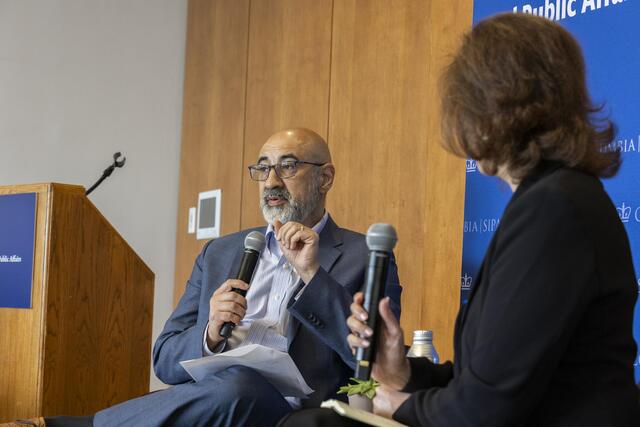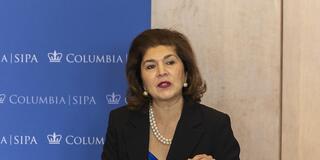
Countering Anti-Muslim Hate: A Conversation with Farah Pandith

In the United States and around the world, anti-Muslim hatred and bigotry have surged in the months since war broke out between Israel and Hamas.
“Anti-Muslim hate is rising, and I believe it will continue to rise unless we see some guardrails put both on society and in the online space,” said Farah Pandith, an adjunct senior fellow at the Council on Foreign Relations and former diplomat, at an April 17 event at SIPA on countering anti-Muslim hate.
Pandith delved into a wide range of topics — from the roots and history of anti-Muslim sentiment, to challenges of identity and belonging for Muslims today, to policies to prevent discrimination and violence — during the discussion, which was moderated by Professor Kian Tajbakhsh.
The Council on American-Islamic Relations received 3,578 reports of anti-Muslim and anti-Palestinian hate and discrimination during the final three months of 2023, marking a 178 percent increase from the same period a year earlier. There has also been a sharp spike in antisemitism during this time, with antisemitic incidents in the United States skyrocketing 360 percent in the aftermath of October 7.
There’s something that has happened to the way people behave with each other — the lack of civility, the lack of the ability to learn how to disagree well. There is a rage and a reaction component to everything we do.
— Farah Pandith
“We’re in a really serious moment, there is a surge of hate across the board,” Pandith said. “There’s something that has happened to the way people behave with each other — the lack of civility, the lack of the ability to learn how to disagree well. There is a rage and a reaction component to everything we do.”
A leader in the field of countering violent extremism, Pandith served from 2009 to 2014 as the United States’ first-ever special representative to Muslim communities. She was appointed by then Secretary of State Hillary Rodham Clinton. The job took her to nearly 100 countries, where she created youth-focused initiatives and engaged with Muslims around the world on building resilience and forming strong networks.
Pandith said she found that many young Muslims struggled with a sense of identity and belonging in the post-9/11 world, as they grew up “hearing very loud headlines and social media headlines about who they were.” She said they were exposed to an onslaught of anti-Muslim rhetoric on the internet, including the idea “that democracy and Islam are not compatible, this idea that there’s an ‘us versus them,’” and that many non-Muslims talk about Islam as though it is “uncivilized” or “barbaric.”
Hate crimes against American Muslims also skyrocketed in the wake of 9/11, with a 1,617 percent increase from 2000 to 2001.
“It is very obviously demeaning, but it is also dangerous because what it does is it sets into the ecosystem a set of norms that dehumanize people, that make them feel less respected, that make them feel like they don’t belong,” Pandith said.

While Islam has a long history in the United States, Pandith said the 1979 Iran hostage crisis and 9/11 led to a climate of pervasive fear, hostility, and suspicion toward Muslims — one that “started easing its way into the American psyche.” She also said general ignorance about Islam and Muslims propagates stereotypes, which results in an environment of misunderstanding and increased harassment. To counter these effects, she said, it’s important to reject extremist narratives and promote recognition of Muslim identities as nuanced and diverse.
Pandith also emphasized that social media companies haven’t done enough to fight anti-Muslim hate and antisemitism. Social media contributes to the spread of extremist content, as algorithms promote outrage and hate, and in the worst cases can lead to radicalization.
Several high-profile hate crimes in the last few months have stoked fears in the Muslim community about the escalation of hate speech to violence. In Illinois, a six-year-old Palestinian-American boy was fatally stabbed by his family’s landlord. Targeted for being Muslim, the boy was stabbed 26 times and his mother more than a dozen (although she survived the attack). In Vermont, three Palestinian-American college students were shot in an unprovoked attack in November.
“It’s not just discrimination or unease,” Pandith said. “There is also violence taking place, so there’s a safety issue that goes into play.”
When asked about students on college campuses feeling anxious due to the rise in anti-Muslim hate and anti-Semitism, and what she’d recommend they do to deal with that, Pandith advised students to seek out allies and outlets to engage with. She encouraged students not to retreat, and instead try to find neutral ground with people who hold different views.
“You cannot live in a state of unease,” she said. “You must find ways to be able to engage in a safe way with people who are different from you… so that your perspective is taken and so you are able to feel that you are part of a community.”
The discussion with Pandith was co-sponsored by Columbia’s Earl Hall Center for Religious Life. It was the second in a series; the previous event was a February discussion on antisemitism co-sponsored with the Kraft Center for Jewish Life and Columbia Religious Life.